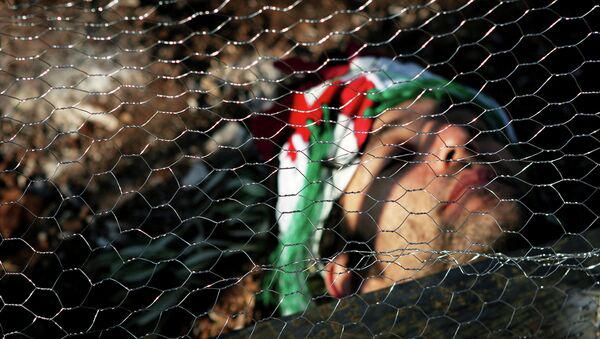In July 9, 2004 the ICJ in The Hague ruled that "the construction of the wall being built by Israel, the occupying Power, in the Occupied Palestinian Territory, including in and around East Jerusalem, and its associated régime, are contrary to international law."
Israel’s Supreme Court gives green light to Cremisan separation wall | PNN http://t.co/zEGz3rhG87 #Palestine pic.twitter.com/9XRZTIy7CZ
— al whit (@soitiz) July 8, 2015
Israel was ordered to cease construction and to make reparation for all damage caused by the construction of the wall. The court urged the international community "not to recognize the illegal situation resulting from the construction of the wall and not to render aid or assistance in maintaining the situation created by such construction."
The ruling also called for the United Nations and all states to ensure that Israel complied with the law.
The wall is eight meters tall in places, more than twice the height of the Berlin Wall. It cuts off villages and people from their own land and often splits communities in two.
Day one in Israel and the biggest thing is how massive and horrible the wall is that separates Palestine from everything else
— Morrell Andrews (@morrellandrews) July 8, 2015
It is now some 700 kilometers long, twice the length of the Green Line, the 1949 ceasefire line that is regarded by many international organisations as the unofficial border between Israel and the occupied West Bank. Eighty-five per cent of the Wall’s route is located within the occupied West Bank.
Another Brick in the Wall
Eleven years on, Israel’s Supreme Court has issued a decision giving the Ministry of Defense and the Israeli army the green light to begin building a new section of what it calls the 'separation wall' in the Cremisan valley near Beit Jala.
Five years ago I took these of the wall dividing Palestine and Israel pic.twitter.com/r7rCFAW7Ir
— champagne mami (@pdotdiamond) June 30, 2015
According to the Palestine News Network, the Saint Yves Foundation condemned the Supreme Court’s decision, saying that the decision would lead to Palestinian loss of land and livelihood and have a long and severe effect on the population’s quality of life.
Since 2008, a UN office collecting data on the damage caused by the construction of the wall, has collected 42,600 claims and over 1.1 million supporting documents.
The UN Office for the Coordination of Humanitarian Affairs highlighted, in its last report, the continuing humanitarian impact of the barrier on Palestinian rural and urban communities. It noted that after a decade, 62 per cent of the wall has been constructed, including 200 kilometers since the ICJ Advisory Opinion in 2004.


